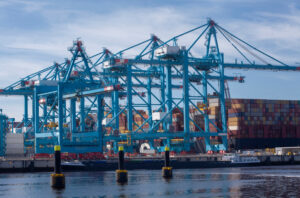North Sea Port has announced that companies in its port area have seen a drop of 12.8% in transhipment traffic year-on-year (YoY) as a result of the COVID-19 pandemic, although the worst effects are starting to ease off.
In a statement, North Sea Port said petroleum products accounted for half the fall – this is a market that was hit hard during the Covid-19 crisis. Transhipment of solid mineral fuels, iron ore and vehicles also declined.
On the positive side, the transhipment figures for scrap are improving, as are those for fertilisers, food products and agricultural products. North Sea Port thus continues to see a mixed picture, with some types of cargo rising will others fall.
However, North Sea Port said this diversity in products and markets that makes North Sea Port increasingly able to withstand the full impact of the Covid-19 crisis.
Transhipment via inland waterways registered a decrease of 3 million tonnes (-7%) during the first nine months of this year, mainly reflecting falls for general cargo and liquid bulk products.
In the third quarter of 2020, transhipment via seagoing vessels (14.7 million tonnes) fell by 15.5% compared to the same period last year. This decrease is 1% less than in the second quarter.
The impact of the Covid-19 crisis is still clearly being felt, North Sea Port said. But since July, losses have eased by a few percent every month. Given this modestly positive evolution, North Sea Port expects losses to continue to shrink towards the end of the year.









